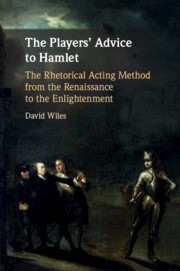 The Players' Advice to Hamlet
The Players' Advice to Hamlet Book contents
- The Players’ Advice to Hamlet
- The Players’ Advice to Hamlet
- Copyright page
- Contents
- Illustrations
- Acknowledgements
- Introduction
- Chapter 1 Hamlet’s Advice to the Players
- Chapter 2 Rhetorical Performance in Antiquity
- Chapter 3 Acting, Preaching and Oratory in the Sixteenth Century
- Chapter 4 Baroque Acting
- Chapter 5 Actors and Intellectuals in the Enlightenment Era
- Chapter 6 Emotion
- Chapter 7 Declamation
- Chapter 8 Gesture
- Chapter 9 Training
- References
- Index
Chapter 5 - Actors and Intellectuals in the Enlightenment Era
Published online by Cambridge University Press: 16 January 2020
- The Players’ Advice to Hamlet
- The Players’ Advice to Hamlet
- Copyright page
- Contents
- Illustrations
- Acknowledgements
- Introduction
- Chapter 1 Hamlet’s Advice to the Players
- Chapter 2 Rhetorical Performance in Antiquity
- Chapter 3 Acting, Preaching and Oratory in the Sixteenth Century
- Chapter 4 Baroque Acting
- Chapter 5 Actors and Intellectuals in the Enlightenment Era
- Chapter 6 Emotion
- Chapter 7 Declamation
- Chapter 8 Gesture
- Chapter 9 Training
- References
- Index
Summary
This chapter is organized around Diderot, who gave much attention to the craft of acting, and remains the best-known eighteenth-century theorist of acting. In two essays of the 1750s, Diderot conjured up a vision of twentieth-century naturalism, echoing Saint-Albine’s fashionable emphasis on feeling, while in his later Paradox on the Actor he argued that the best actors reproduce emotion on stage through cold analysis. Diderot invoked numerous contemporary actors, and this chapter establishes how the point of view of these actors differed profoundly from that attributed to them by Diderot. Antoine-François Riccoboni: who emphasized core technique for the benefit of amateurs. Marie-Jeanne Riccoboni: patronizingly dismissed by Diderot, who went on to adopt her arguments. Marie-Madeleine Jodin: a rebellious protégée who rejected his advice. Michel ‘Kelly’ Sticotti: a jobbing actor whose ideas had a complex genesis. Hyppolite Clairon: a remarkable actress and teacher whose published account of the acting process offers a more subtle analysis than Diderot. François-Joseph Talma: an articulate actor who challenged Diderot’s attack on Sticotti. Coda: theatre and oratory: two modes that remained closely related, despite claims that theatre somehow ‘liberated’ itself from oratory.
Information
- Type
- Chapter
- Information
- The Players' Advice to HamletThe Rhetorical Acting Method from the Renaissance to the Enlightenment, pp. 140 - 177Publisher: Cambridge University PressPrint publication year: 2020